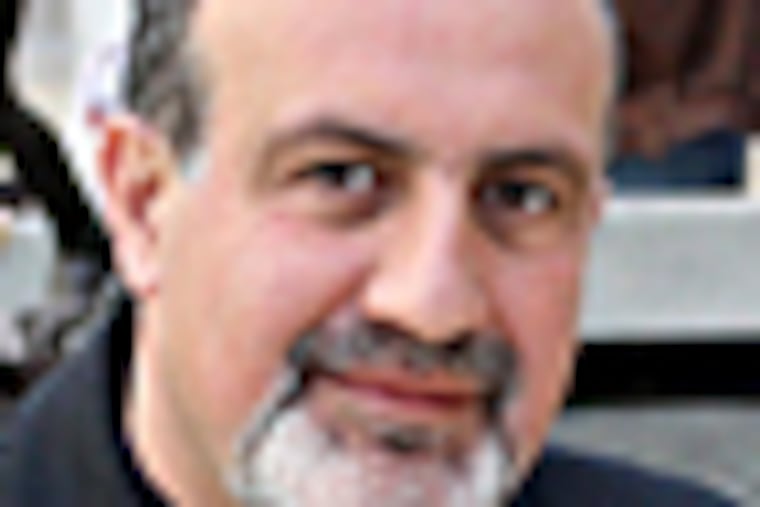He'd have us embrace change and uncertainty
Why were we utterly unprepared for the Sept. 11 attacks? How come political pundits didn't foresee the fall of the Berlin Wall and the dismantling of the Soviet Union?

Why were we utterly unprepared for the Sept. 11 attacks?
How come political pundits didn't foresee the fall of the Berlin Wall and the dismantling of the Soviet Union?
How could our economic brain trust, with all their Nobel Prizes, not anticipate the 2008 economic meltdown?
We didn't see any of it coming, says Nassim Nicholas Taleb, because we couldn't.
History, Taleb argues in his new book, Antifragile: Things That Gain From Disorder (Random House, $30), is shot through with random, unforeseeable events. And no amount of prognostication - scientific or psychic - can change that.
A former derivatives trader with an MBA from the Wharton School, Taleb will discuss his book at the Free Library, 1901 Vine St., at 7:30 p.m. Thursday.
Born in Lebanon in 1960, Taleb, who holds the title Distinguished Professor of Risk Engineering at New York University's Polytechnic Institute, has emerged over the last decade as one of the most formidable intellectual opponents of the view, ingrained in us for two centuries, that scientific reason enables us to predict future events - and keep us safe from their sometimes destructive effects.
By turns acerbic, folksy, humorous, and densely technical, Antifragile is a must-read for anyone looking for a different way to organize our financial and social institutions.
Taleb's primary assumption is one he shares with an intellectual forebear, Friedrich Nietzsche. He argues that humans as a rule are so threatened by the idea of change and chaos that we construct elaborate explanations that give us a false sense of security.
These stories help us hide from the truth: that history is often shaped by random collisions of events that have far-reaching effects on human life.
As the adage goes, if Cleopatra had been born with a bigger nose, Mark Antony might not have fallen for her, and Rome - and, in consequence, Western civilization as we know it - would have been far different.
How could anyone have predicted that the assassination of Archduke Franz Ferdinand of Austria in 1914 would lead to one of the most destructive wars in history?
"We don't understand the world, the generating processes of historical events," Taleb said in a phone interview. "We cannot . . . rely on our knowledge to predict events in so many fields [such as] history, economics, politics."
In his 2007 book, The Black Swan, Taleb called such unforeseen revolutionary mutations in history "black swan events," responsible for every major development in human history.
The term black swan was widely used in 16th- and 17th- century England as a metaphor for something so ludicrously impossible as to be not worth considering. That's because people believed all swans were white.
Tell a fib about some adventure you had, and you might be told, That's about as likely as a black swan - until 1697, when there was a recorded sighting of a black swan.
If unforeseen, volatile events determine our future, then how can we survive? How can we build an economic system that isn't so fragile?
"Most people would say that the opposite of fragile is robust," says Taleb. Working under that assumption, we've built large, rigid institutions.
"Everybody wants to be safe," says Taleb, "but being safe can destroy you."
Companies, schools, charities, governments aren't machines, but living organisms, says Taleb. Force them to remain static in the name of stability, and they'll wither.
"The opposite of fragile isn't robust, but antifragile," says Taleb, coining an admittedly inelegant term.
For Taleb, evolution is the ultimate example of the antifragile: It's propelled by change, mutation, the unexpected. Individual species may die, but the river of life continues with the emergence of stronger organisms.
"Human systems are more like living organisms than they are like unchanging objects," says Taleb.
And living organisms flourish by overcoming adversity. "Just as your muscles need resistance to become stronger," Taleb says, "corporations, groups, [and] organizations also require variables and shocks."
For Taleb, the gravest sin committed against the American economy is to try to make it run without any bumps or shocks, an approach that he says was promoted by former Federal Reserve chairman Alan Greenspan.
"Greenspan doesn't like fluctuations," says Taleb, "He doesn't understand that fluctuations can help make you stronger," just as weights do for muscles.
Taleb says the restaurant and airline industries are good examples of antifragile systems: The death of a specific company doesn't affect the whole industry. The industry as a whole learns from the company's mistakes and improves.
"The airline industry is set up in such a way as to make travel safer after every plane crash," he wrote in a recent newspaper piece.
Similarly, when individual restaurants fail, the industry as a whole learns and grows from the experience. "The collective enterprise benefits from the fragility of the individual components," says Taleb.
The opposite is true of the financial industry, Taleb says: Dominated by companies so large that their failure would bring down the entire economy, they were unable to adapt. Yet, Taleb notes ruefully, many of the men and women who ran failed companies walked away in 2008 with millions in their pockets.
"At no time in the history of humankind have more positions of power been assigned to people who don't take personal risks," he writes. Corporate leaders, he insists, ought to flourish or fail according to - not despite - their company's performance and health.
Antifragile asks a great deal of us: to embrace the idea that we live in a world shot through with uncertainty. Its lessons, Taleb insists, aren't useful only in the corporate world, but translate into an existential plan for individual living.
"The question we need to ask," he says, "is how to live in a world we don't understand."